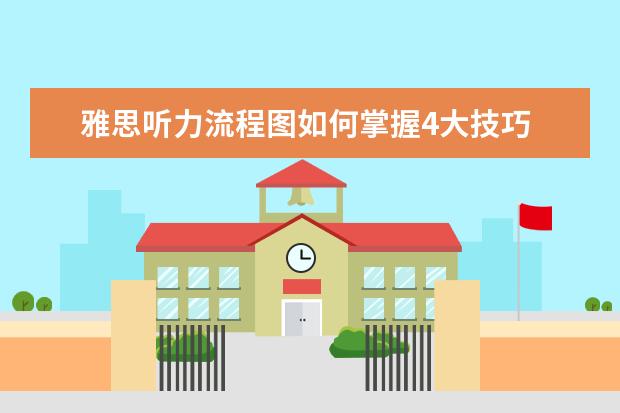雅思考试主要是通过对考生听、说、读、写四个方面英语能力的考核,综合测评考生的英语沟通运用能力,实现“沟通为本”的考试理念。对于雅思考生来说,也有很多考试难点和政策盲区需要帮助解答。今天雅思无忧网小编准备了雅思口语part3回答技巧 如何应对雅思口语Part3的利弊分析?,希望通过文章来解决雅思考生这方面的疑难问题,敬请关注。

雅思口语Part 3怎么答才能征服考官
雅思口语Part 3怎么答才能征服考官一、听得懂是关键
雅思口语的评分标准是以下四个:
Fluency and Coherence
Lexical Resources
Grammatical Range and Accuracy
Pronunciation
大家会发现,这里面没有“听得懂”这一项。但其实,对于在考官现场发问的Part 3,这一项是隐含的评分标准。听得懂是有效交流喊喊缓的关键。
很多同学会问,那听不懂怎么办?我们把听不懂分为两种情况:
第一种:考官语速快,如果说慢一点,就能听懂。
如果是这种情况,大家在现场可以说:“Pardon,please?”或者用句子:“Sorry, I didn't catch the question. Could you please repeat it?”当然,如果连续几道题目都出现“Pardon”,那我们的交流状态就不是很理想了。
第二种:存在生词。
那这种情况下,可能考官重复3 遍也没有用,因为词汇制约了你对于题目的理解。
如果是这种情况,建议大家使用一个词:“Paraphrase”,也就是说,让考官换
一种方式问问题,那么正常情况下,他会用一种稍微简单一点的方式解释一下。
总之,听得懂是答得出的关键,还是希望大家在第一时间听懂问题并且做出回应。实在遇到特别长难的题目,我们可以采用抓关键词的方法。比方说这个问题
Who do you think should pay for the services that are available to the people in a community?
Should it be the government or individual people?”
很多同学都觉得没有生词,但听完之后觉得没记住。如渗仔果我们可以抓住关键词“pay, service, community, government, individual”, 那理解起来就事半功倍了。
雅思口语Part 3怎么答才能征服考官二、讲够5-8句话
为什么会有答题长度的要求呢?因为Part 3 的题目是对于Social life, 也就是社会生活等话题的讨论,核心词是“Discussion”,也就是说这一部分需要我们对于“年轻人与老人相处”、“学校教育”、“互联网时代”等等话题用英文进行探讨,考察我们结合社会生活实际,分析和讨论问题,论证观点的能力,所以,如果只答出两三句话,未免显得不充分和单薄。
雅思口语Part 3怎么答才能征服考官三、有一定的广度
广度其实就是分类讨论的能力,在分析问题的时候,希望大家尽量多想到几种情况,会根据主体或者正反面分类,不要仅仅停留在一个侧面,或者一个层面的分析。
举一个非常简单的例子:“What sports do Chinese people like?”
那这种情况下大家不能说“Football”或者“Basketball”这样一概而论。因郑模为不同的年龄和性别,对于运动的选择可能不一样。那我们可以按照年龄段分类,比如说,可以分成children, teenagers, working people, the elderly. 或者我们也可以分性别,分成men and women 再去讨论。
我们拿真题来试试:“What types of people become famous in your country?”
问在中国什么样的人会出名,那我们可以按照行业进行分类,比方说,
show business/entertainment industry 娱乐圈的艺人靠movies, albums 出名
successful busines*en 比方说Jack Ma,靠自己的company, products 出名
university professors/scholars/writers 通过research, books,novels 为人所知,
这几年新兴的Internet celebrities,也就是网红,通过uploading videos and selfies 出名
再来试试这道题“Why do many people like going to concerts?
我们来看看这道题目的一个Sample Answer:
“I suppose that people go to concert for different reasons. Some people want to experience good music first-hand. They think the music in live concerts is much better than recorded music. Others want to get closer to the musicians and singers they are crazy about. They want to see their idols and interact with them in person. There are also people who go to rock concerts just to relax because they always suffer from a heavy workload. The atmosphere in live concerts helps them unwind because screaming out loud with other fans could help them release their pressure.”
雅思口语Part 3怎么答才能征服考官四、有一定的深度
这一项给冲7 分以上的同学参考,如果大家的目标分数是6.5,那么达到以上的3 点就可以。
雅思口语怎样做好 Part3的问题分析和解题思路 - 百...
雅思口语Part3常见问题规律及解题思路
很多考生在准备雅思口语的时候喜欢把重点都放在Part2上面,而Part3的问题往往是看一眼就过去了。但实际上Part3的问题往往很抽象又难回答,更不可能像雅思口语Part 2一样有一份具体的题库,如果是毫无准备的情况下被问到,经常是卡壳而没有条理地胡说一通,前面的精心准备也大打了折扣。今天就分享一下常见的雅思口语Part3问题规律,和一些答题的思路,以不变应万变。
Young vs. Old / Children vs. Adult
很眼熟对不对?没错,这就是套到任何一个话题都能用的神百搭问题。并且可以幻化出无数个类似但不相同的问题来银喊,比如:Do young people and old people have different attitudes towards X? What do you think young/old people should do X? Do you do X the same way when you were a child?等等等等,总而言之就是想问随着年龄的增长,对某一个事物或者行为的看法或者做法有什么样的改变。
因为这个问题是可以放进任何一个语境里提问的,所以大家不要想当然的认为这其中锋局野就一定有差异,有的时候反而找不出任何差异,那也就诚实回答即腊枣可,不必牵强附会硬要找出什么区别来。这个问题其实不难,套路就是先回答有没有差异,如果有就说说看,如果没有就说没有。
Chinese people
大概是因为外国人自然就对中国感兴趣,很多话题里会出现What do Chinese people think of ? How do most Chinese people do X?等等冠冕堂皇的问题,这种问题宏观又抽象,情急之下非常难回答的圆满,其实不论问题是什么,都可以这么回答——There is no way for me to know each Chinese’s opinion, but personally speaking, ..., 后接自己对这个话题的观点,很巧妙地就能避开宏观,从自己的观点出发,也不怕他后续接着提问了。
Modern vs. Traditional
又是一个非常眼熟的问题,主要和technology啊,Internet什么的挂钩,经常会问两者之间的差异,你比较喜好哪一种,你觉得再发展下去是什么样子的等等。建议大家在准备P2的时候如果遇到相关话题,留个心准备一下,其实也就是花点时间思考一下,有个大致思路到时候能照着说就行。重点放在今夕对比,还有就是自己的喜好态度一定要鲜明。
Pros vs. Cons
俗而烂的题目,让你议论某个行为或者物件的利弊。可以首先谈利,X certainly brings lots of benefits into the world, ...,然后一转语气谈弊, but on theother hand, X also has its drawbacks, ..., 只要体现出一个转折即可。至于内容,能简单说出一两个即可,也不需要多全面。
Past vs. Present vs. Future
这个问题其实和1和3都是能够交叉重叠反复出现的,可见出题人有多懒。应对策略也一样,有就有没有就没有,如果有就鲜明对比出来,如果没有就简单说两句为什么不会有。过去和现在都好说,对于未来就要靠大家发挥自己的想象力了,我个人觉得与其绞尽脑汁想细节,还不如直接走极端到底让考官问不出后续问题。比如我遇到过一个问题是What do you think this classroom will be in the future?与其去回答究竟会变成什么样子,*脆就准备的是I think there will be no more classrooms of this kind, since all the exams will be taken online. 直接把教室就变没了,他自然也就不会再追问细节了。
Male vs. Female
发现了没,雅思口语part3最爱考的其实就是对比,男女性别之差又是一大对比,主要是问态度方面的差异。答题思路大家都明白了,考官就是想听到你说出二者差异之处和在,所以越鲜明越好。当然也可以反其道而行之,说没有任何差异,反正是个人观点,不会有对错之分的。
Beneficial for children?
接下来不是对比,但也是万能问题。雅思除了纠结对比,还很喜欢纠结于祖国的花朵,也就是儿童,任何话题都要和儿童扯上关系来问,顺便还会问父母老师的教育方法,整个教育体制,甚至和前面的老人对比,总之就是以儿童为中心发散开去。当然我们的答案也要以牙还牙,就抓住儿童的特点。一个关键词susceptible. 这个词既点明了儿童的特点,又为你下面的阐述做铺垫,更关键的是这个词儿的高级程度基本上能让考官眼前一亮!所以可以回答:Children are the most susceptible group in our society, they are constantly curious about everything around them and by nature want to learn stuff from their surroundings.So...接下来谈X对儿童的影响,或者父母老师的教育,都是手到擒来的事儿啦。
Governmental support?
这个话题虽然有些敏感,但出现频率也不小,主要是问一些社会问题应不应该得到*的资助,比如图书馆的修建啦,教育啦,等等等等,回答一般都是yes,当然啦你答No也不会因此扣分的,自圆其说即可。这个问题看似高级,很容易让烤鸭乱了阵脚,回答起来也很简单: Yes, X is extremely important to A,B, and C.Government should take the responsibility to help X develop andprogress, best by supporting it financially.
Importance?
很简单啦,就是问某个事物的重要性,很泛泛很抽象的问题,大家自己准备话题的时候留个心吧,因为这个也没有啥模板可以套,能说出个一两点就行了,如果能够带入到个人自己身上具体举例说就更棒了,亦鸥上的根据Part2的两个part3方向非常好。
How do A affect B?
这个问题会跟前面所有问题千丝万缕地联系在一起出现,其实只要把前面的对比啊重要性啊啥的搞清楚了,回答起来也没啥困难的。问题这么问就证明肯定A对B肯定是有影响的,你只要回答出来可能的方式即可。给大家一个思路就是从物质和精神两方面去分析,首先A对B会不会产生什么实体物质上的影响,其次会不会上升到精神层面,一层一层分析自然有条理逻辑。
Will A replace B in the future? Will B disappear in the future?
这个也是关于technology的,又要遥想未来了。遇到此类问题可以按照自己的想法去回答,但回答No可能会更好展开:Idon’t think so, for B is still crucial in ...,and people still have the need to use B for various functions that A can not compete with.
无论考官在提问时用了什么“套路”,都千万不要套用模板来应对~因为你永远也不可能知道考官在识破你背模板时内心都是怎样开启弹幕吐槽模式的。
雅思口语Part 3的答题技巧演示。
今天,环球青藤朱滚睁国伟老师和大家分享一篇关于雅思口语Part 3的答题技大毕岁巧演示文章,值得大家阅读学习。更多精彩好文章,尽在环球青藤!雅思口语Part 3问题1:What are some reasons why people eat out ?雅思口语数唤Part 3的答题技巧演示1:It’s a tradition that we intend to treat our friends and family on some special occasions , especially on birthday , and some important days . a fancy restaurant can provide us decent dining environment , delicious cuisines and thoughtful service . by the way , these days , office workers are getting busier , they have no time to prepare home cooked food , eating outside is the only remaining option .雅思口语Part 3问题2:Do you prefer to eat at a restaurant or eat at home ?雅思口语Part 3的答题技巧演示2:I prefer to eat at home . my mother is good at cooking , she usually prepares a table of delicious dishes at home . by the way , my country has a notorious reputation of food security . so eating at home is much safer.雅思口语Part 3问题3 What are the differences between eating at home and eating at restaurants ?雅思口语Part 3的答题技巧演示3: Eating at restaurants , you may enjoying a decent dining environment , cuisines with different taste and flavor , and thoughtful service . compared to eating at restaurant , dishes prepared at home are simple but balanced and nutritious .雅思口语Part 3问题4In my opinion what is healthy food ?雅思口语Part 3的答题技巧演示4: A healthy meal should be balanced and nutritious . in each meal , we need to intake various vegetables , different kinds of fruits and many types of proteins . by such way , we may maintain a good physical health .雅思口语Part 3问题5What are some examples of unhealthy food ?雅思口语Part 3的答题技巧演示5:In my opinion , there are many types of unhealthy food , like western style fast food , desserts with high calories , and food sold at street vendors . food like French fries , hamburgers are very harmful to our health .以上即是本次环球青藤口语老师朱国伟的关于雅思口语Part 3的答题技巧演示文章分享。逻辑能力强,精通口语词汇。对于欧美的文化很了解。多年的教学经验帮助了不少雅思考生顺利进入理想学府,桃李满园。相信他的这篇文章必定能给与烤鸭们不少帮助和启发。如果对于我们雅思课程想了解更多的话,欢迎与环球青藤课程顾问做进一步的咨询与了解,这里有不同的单项课程以及全项课程,适合不同要求的你!后,环球托福预祝各位雅思考试取得!早日圆满出国留学梦!
如何应对雅思口语Part3的利弊分析?
雅思口语第三部分往往是对于第二部分的一个拓展衍生,这部分的问题比较的深入,有时候是需要考生有一个批判性的思考方式。所以环球青藤老师就来谈谈如何应对雅思口语Part3的利弊分析。出题方式:判宏巧What are the advantages and disadvantages of ….?解题思路:利弊分析,即要求考生讨论advantages & disadvantages,建议考生从不同角度不同方面去考虑这个问题。比如从个人和社会角度,从科教文卫体五大角度等等。总之,在回答的时候,可以适当地对于分析对象进行分类,然后阐述观点。考生的回答思路大致如下:首先先明确地指出优缺点,建议用一句话概述即可。然后给出具体的理由或者例子进行解释说明。随后进行总结,究竟是利大于弊还是弊大于利或者视情况而定。常用表达:One of the main advantages of….A key advantages of….A really good thing about….Another advantage of….Another good thing about…范例:What are the advantages and disadvantages of working outdoors?I think it really depends on what kind of job you have outdoors. In general, most outdoor jobs are quite physical, so I think that they can help people keep fit and healthy as well as being outside in the open air. On the other hand, it can be awful to work outside because you may have to work in terrible weather, like rain, snow and extreme cold.分析:这道题目掘键是问户外工作的优缺点。考生的回答很客观,这要视工作性质而定。大多数的情况下,户外工作是需要体力劳动的,这有助于人们计划持健康,但是有时候在恶劣环境下工作是非绝陪常可怕的,比如暴雨暴雪或者是很冷的天气。考生将优缺点描述的很清楚,结构与思路也十分清晰,是值得学习的。练习:接下来的几道题目,学生可以自己利用上述方法进行练习,体会其中的解题技巧和步骤。What are the advantages and disadvantages of keeping pets?What are the advantages and disadvantages of public transportation?What are the advantages and disadvantages of having a big family?
雅思口语part3做题技巧?我这部分总是分数比较低 - ...
洛阳大华雅思提醒您,
一)题目的性质从原来较为生活化的Part 1和Part 2转化为Part3中带有强烈学术意味的考题。比如How does scientific research benefitspace, medical, environmental and information technologies? 该题问科学研究给现代技术带来怎样的好处。
二) 很多考题不再注重具体的细节描述或陈述,而转向考察考生的抽象思维能力。比如Does money bring people more happiness or make them less secure? 该题问钱会给人带来幸福,还是使人更不安全。碰猜拿
三)有相当数量的题目会让考生去对某个话题进行评估(Asses*ent),特别是利弊方面的评估;还有些考题让你对未来进行猜兆局测(Speculation),让你说10年或20年之后某事物将会怎么样。比如In your opinion, what languages will become morepopular in the future? 该题要你猜测将来什么语言会变得流行起来。当然,你还必须说明理由。
总的来说,Part 3已经超越了日常生活层面,进入到人的深层思维体系之中。它着重的是四样东西:world views(世界观),beliefsystems(信仰体系),values(价值观),attitudes(态度)。要把这些东西说好,除了平时的语言功底和随机应变的能力以外,考生还需要具备一些人文方面的素养。
虽然Part 3的问题错综复杂,但根据笔者的教学及实战经验,我们完全可以把所有Part 3的考题分为以下的九个大类,每一大类都含有若干典型的问话套路:
一)阐述原因(Giving reasons)
Why do you think …?
Why is it important to do…
Do you think …? Why (not)?
Is it a good idea to (do…)? Why (not)?
二)预测未来(Providing speculations)
How do you see … changingin the future?
Do you think that in thefuture people will …?
What do you think willhappen to … in the future?
In your opinion,which/what … will become more … in the future?
三)描述侧面(Describing various aspects)
In what ways …?
What kind/sort/type of …?
How important is it for …to (do …)?
How has … changed (in yourcountry) in the last … years?
四)维护立场(Defending your choice)
Is it better to (do …) or(do …)?
笑搭Should people always … oris it a good idea sometimes to (do …)?
Which is more important toyou: … or …?
Which do people in yourcountry prefer: … or …?
五)利用常识(Using your common sense)
Any yes-no question thatinvolves a clearly positive or negative answer
Any question that asks youabout the roles, responsibilities and general qualities of a social group
Any question that asks youabout common knowledge, everyday experience and traditional culture
六)提供方案(Offering solutions)
What can … do to (do …)?
What can be done to (do…)?
What do you think is thebest way for … to (do …)?
Are there other wayspeople can …, apart from …? How?
七)因果关联(Connecting causes with effects)
What effect has … had on…?
How has … affected …?
Are there any negativeeffects of … doing …? What are they?
What do you think causes …to …?
八)对比异同(Comparing similarities and differences)
How does … compare with …?
How do you compare … with…?
Do you think … wasdifferent for your grandparents?
What are similarities anddifferences between … and …?
九)陈述利弊(Illustrating advantages and disadvantages)
What are the advantages anddisadvantages of …?
What are the differentadvantages of … and …?
What do you think theirdisadvantages are?
How do people in yourcountry feel about (a controversial issue)?
从《剑桥雅思》的口语出题风格来看,一般一套口语题的Part3部分会有6道问题,这一点大家可以参阅《剑一》到《剑七》的真题。下面的这套题从place到travel/touri*再到old buildings/historic buildings,提出了一系列问题:
Why do you think peoplelike to travel to different places?
→ 第一类:阐述原因(Giving reasons)
How do you see touri*changing in your country in the future?
→ 第二类:预测未来(Providing speculations)
Why is it important toprotect the countryside?
→ 第一类:阐述原因(Giving reasons)本文
In what ways is thecountryside in danger in your country?
→ 第三类:描述侧面(Describing various aspects)
Why are historic buildingsand monuments important to a city?
→ 第一类:阐述原因(Giving reasons)
Is it better to keep oldbuildings, or build new modern ones?
→ 第四类:维护立场(Defending your choice)
由此可见,任何Part 3的问题都可以归入以上九大类中的某一类。在本系列的后面九讲中,针对每一类问题的特殊性,为大家一一分析破解它们的方法,也希望广大“烤鸭”们能切实利用这些方法来为自己的考场发挥添砖加瓦。
总的来说,雅思口语考试Part 3作为考试中第三部分,也是最困难的一个部分,所以把握好总结的雅思口语考试Part 3答题技巧也就非常重要.
以上就是雅思无忧网为您准备的雅思口语part3回答技巧 如何应对雅思口语Part3的利弊分析?全部内容。访问雅思无忧网(https://www.yasi.cn/),了解更多雅思考试新消息,新动态。
雅思培训
免责声明:文章内容来自网络,如有侵权请及时联系删除。


 雅思单科可以重考费用/流程/考试形式全解析+利弊分析(重磅官宣!雅思单项重考正式上线,终于能拼分啦!)
雅思单科可以重考费用/流程/考试形式全解析+利弊分析(重磅官宣!雅思单项重考正式上线,终于能拼分啦!)
 雅思单科可以重考费用/流程/考试形式全解析+利弊分析(重磅官宣|雅思单科重考!2024大陆首发,一篇读懂雅思单科重考规则)
雅思单科可以重考费用/流程/考试形式全解析+利弊分析(重磅官宣|雅思单科重考!2024大陆首发,一篇读懂雅思单科重考规则)
 9月19日首都师范大学雅思口语考试安排 雅思UKVI中国考点-UKVI雅思考试特点全面分析及全国考点清单
9月19日首都师范大学雅思口语考试安排 雅思UKVI中国考点-UKVI雅思考试特点全面分析及全国考点清单
 雅思听力流程图如何掌握4大技巧
雅思听力流程图如何掌握4大技巧
 保定环球教育教你雅思写作流程图答题技巧! 新版//剑桥雅思12Test8流程图解析+范文
保定环球教育教你雅思写作流程图答题技巧! 新版//剑桥雅思12Test8流程图解析+范文
 华盛顿大学申请难度大吗?主要原因和应对措施
华盛顿大学申请难度大吗?主要原因和应对措施
 浙江哪几个城市能考雅思 雅思UKVI中国考点-UKVI雅思考试特点全面分析及全国考点清单
浙江哪几个城市能考雅思 雅思UKVI中国考点-UKVI雅思考试特点全面分析及全国考点清单
 英国留学应该选择哪种雅思考试? 雅思UKVI中国考点-UKVI雅思考试特点全面分析及全国考点清单
英国留学应该选择哪种雅思考试? 雅思UKVI中国考点-UKVI雅思考试特点全面分析及全国考点清单
 4月26日太原雅思口语考试时间公布(山西太原市10月份雅思考试时间汇总)
4月26日太原雅思口语考试时间公布(山西太原市10月份雅思考试时间汇总)
 厦门新东方雅思课程学费 雅思UKVI中国考点-UKVI雅思考试特点全面分析及全国考点清单
厦门新东方雅思课程学费 雅思UKVI中国考点-UKVI雅思考试特点全面分析及全国考点清单